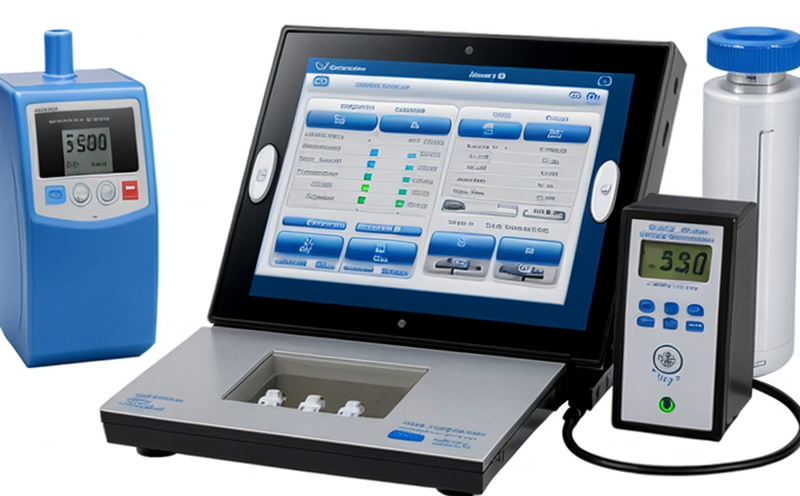Drop and Shock Resistance Testing for Infusion Pumps
The integrity of medical devices is paramount in ensuring patient safety. Drop and shock resistance testing is a critical step to verify that infusion pumps and drug delivery systems can withstand the rigors of real-world use, from being accidentally dropped during transport to withstanding jarring impacts during handling and usage. This service ensures that these devices meet stringent regulatory requirements set by bodies such as the US Food and Drug Administration (FDA), European Commission (EC), and International Organization for Standardization (ISO).
During drop testing, a device is subjected to controlled falls from various heights onto a hard surface, simulating potential impacts during transit or handling. Shock resistance tests, on the other hand, subject devices to sudden acceleration changes that mimic drops, vibrations, and other mechanical stresses encountered in use.
The process involves rigorous specimen preparation, ensuring that each pump is in optimal condition for testing without compromising its integrity. Preparing specimens includes verifying battery charge levels, calibrating settings, and ensuring the device is fully operational before testing begins. For shock resistance tests, devices are placed on a specially designed platform that can induce controlled accelerations. The test setup may include a drop tower or a specialized shaker table.
The acceptance criteria for these tests are based on international standards such as ISO 14752-3 and IEC 60601, which mandate that devices must function correctly after the imposed stresses without any failure. These standards also specify parameters like drop heights (e.g., 1 meter) and impact durations to ensure consistency across different test environments.
Drop and shock resistance testing ensures not only mechanical integrity but also the reliability of critical components within infusion pumps, such as batteries, circuit boards, and sensors. This service plays a crucial role in ensuring that infusion pumps are safe and effective for use in clinical settings, where failures could have serious consequences.
The testing process is highly controlled to ensure accurate results. Test parameters include the height from which drops occur, the material of impact (such as concrete or steel), and the duration of the shock. These factors are chosen based on expected real-world scenarios that these devices might encounter. For instance, an infusion pump used in a hospital setting may be more likely to experience a drop than one used at home, so the testing parameters reflect this.
Post-testing analysis involves thorough examination and evaluation of the device’s condition following each test cycle. This includes checking for any signs of damage or malfunction, such as cracks, dents, or changes in performance metrics like battery life or accuracy of drug delivery. Any issues discovered are documented meticulously to provide insight into potential areas of improvement.
The results of these tests are used by quality managers and compliance officers to make informed decisions about product improvements and regulatory submissions. R&D engineers rely on this data to refine design iterations, ensuring that future models can better withstand the rigors of real-world use. Procurement teams also benefit from such testing, as it helps them select suppliers who meet high-quality standards.
By incorporating drop and shock resistance testing into their product development processes, manufacturers can demonstrate a commitment to patient safety and regulatory compliance. This service not only protects the integrity of medical devices but also fosters trust between healthcare providers, patients, and regulatory authorities.
Applied Standards
The drop and shock resistance testing for infusion pumps is governed by several international standards that ensure consistent and rigorous testing practices. These include:
- ISO 14752-3:2016 – This standard specifies the requirements for environmental stresses, including mechanical stresses such as those encountered during transportation and handling.
- IEC 60601-1-2:2014 – This international standard covers essential aspects of electromagnetic compatibility (EMC), which is crucial for ensuring that medical devices do not interfere with each other or with critical infrastructure like medical imaging equipment.
- USP : Biological Test – While not directly related to mechanical testing, this test ensures that the device does not release any harmful substances into the body during use.
These standards provide a framework for manufacturers and laboratories to follow when conducting drop and shock resistance tests. Compliance with these standards helps ensure that medical devices meet both regulatory requirements and industry best practices.
EuroLab offers unparalleled expertise in the field of medical device testing, providing a comprehensive range of services tailored to the unique needs of infusion pumps. Our state-of-the-art facilities are equipped with the latest technology and instrumentation, ensuring accurate and reliable test results.
Our team comprises highly skilled professionals who possess extensive experience in both the theoretical aspects of testing and practical application. This diverse skill set allows us to offer a holistic approach to medical device testing, addressing all facets that contribute to product safety and efficacy.
EuroLab’s commitment to quality is reflected in our rigorous adherence to international standards. We are accredited by leading organizations such as the European Co-operation for Accreditation (EA) and the International Laboratory Accreditation Cooperation (ILAC), ensuring that our tests meet the highest industry standards.
Our services extend beyond drop and shock resistance testing, encompassing a wide array of other medical device tests including biocompatibility studies, electrical safety assessments, and sterility testing. By offering these additional services, EuroLab provides clients with a one-stop solution for all their medical device testing needs.
EuroLab’s dedication to innovation is evident in our continuous efforts to stay at the forefront of technological advancements. We regularly invest in new equipment and methodologies to ensure that we can provide cutting-edge testing capabilities that meet current and emerging regulatory requirements.
Our clients benefit from EuroLab’s global reach, allowing them access to international markets with confidence knowing that their products have undergone rigorous testing according to relevant standards and regulations. This global perspective ensures that our clients are well-positioned to navigate the complexities of international trade.





